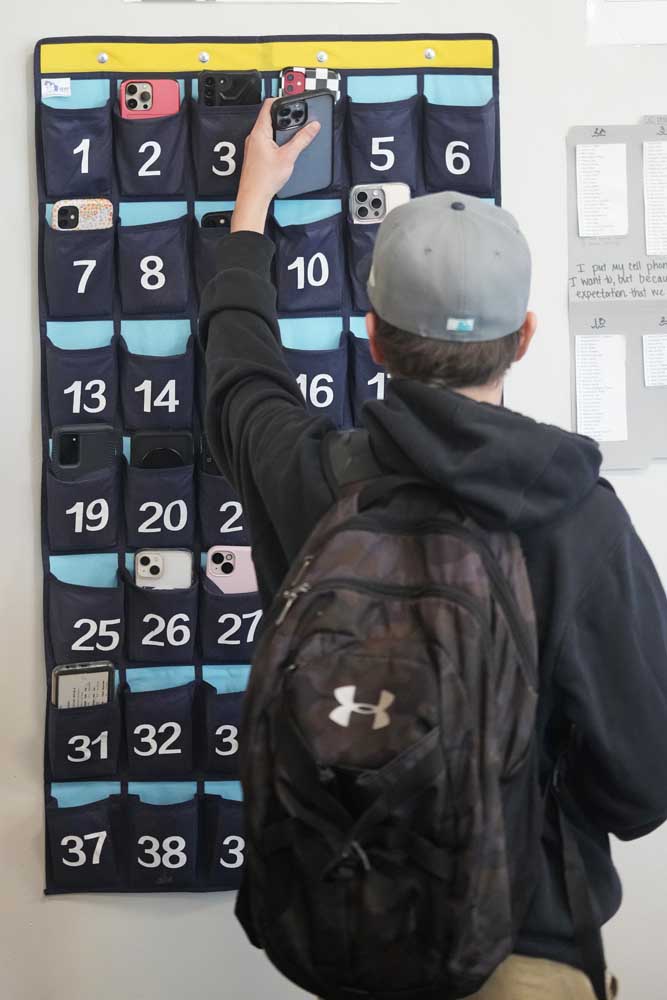Kotek’s ban on student cell phone use will change some local policies
Published 7:33 am Thursday, July 10, 2025

- A ninth grader places his cellphone into a phone holder as he enters class at Delta High School, on Feb. 23, 2024, in Delta, Utah. At the rural Utah school, there is a strict policy requiring students to check their phones at the door when entering every class. Each classroom has a cellphone storage unit that looks like an over-the-door shoe bag with three dozen smartphone-sized slots.
Gov. Tina Kotek issued an executive order July 2 requiring K-12 public school districts to create policies prohibiting student cell phone use from “bell to bell,” or from the start of the school day to the end of instructional time.
Students nationwide have been experiencing increased mental health issues over the past few years. Research shows that cell phone use, especially being on social media, has a negative effect on kids’ mental health and self-esteem. One intention is that Oregon students will improve in math and reading if the distraction of cell phones is taken away.
The ban does not include laptop computers or devices being used in schools. Policies must be adopted by Oregon school districts no later than Oct. 31 and put into place by January. Policies must make it clear where cell phones are to be stored during the day, and make exceptions for medical reasons, special education plans, or a written exemption. The exemption should follow a procedure set up by school officials.
Trending
School districts must create consequences for students who fail to follow the policy. Consequences cannot include loss of instructional time, which includes suspension or expulsion. The Oregon Department of Education will monitor districts to make sure policies are put into place.
More than 15 other states have put a cell phone ban into place, and others are considering the possibility. Texas Gov. Greg Abbott signed a similar ban in June.
State Rep. Emerson Levy (D-Bend) has been working on a cell phone restriction policy with other state legislators for over a year. Her bill died in the Oregon Legislature earlier this year. She said the governor made the right call, but knows people will have mixed feelings about the order.
“You’re changing a behavior in an environment where there is a lot of anxiety about safety, and that is the challenging thing to do,” she told The Bulletin Monday. “A bell-to-bell ban is one of the most important things we can do for kids’ mental health and their academics.”
Educators will need to make sure kids are prepared to be off their devices, which will look different in every district, Levy said. She said she cares about kids’ well-being and hopes this turns things around.
What do schools and local advocates think?
Bend-La Pine Schools has had an “off and away” phone policy for several years for all students, with some flexibility for high school students. Once the governor’s order goes into effect, high schoolers won’t be allowed to access their phones during lunch and passing periods, in addition to class time.
Trending
Redmond School District allows students to use their phones during lunch and passing periods, according to district policy. Phones can be used in class for academic or emergency reasons, but cannot be used a way that would “disrupt the learning environment.” The district will update the policy per the governor’s order, staff will receive training on how the updated policy will be put into place and students will be taught how to use phones and other devices responsibly, according to the district.
Crook County Schools has implemented a similar policy to Bend-La Pine Schools. Interim Superintendent Joel Hoff said elementary and middle school students already have their cell phones off and away throughout the day. High schoolers are allowed to have their phones out at lunch. Students might have job schedules to check or may need to coordinate picking up siblings. The district doesn’t want this policy change to drive students off-campus for lunch, where there is less supervision, said Hoff.
The state education department and the Oregon School Board Association are creating sample policies for districts to consider, he said. There are logistics and timeline concerns, Hoff said, and the district will consider how to put this in place by the deadline. The board plans to discuss it at its August meeting.
“We want a distraction-free learning environment, where students can focus on academics,” he said.
Well Wired is a local advocacy group that champions having a healthy relationship with technology, especially for kids. Founders Ami Formica and Brooke Mues are “thrilled” that Kotek has signed this order. They feel that local control has fallen short in Central Oregon and said only a few districts in Oregon set policies to ban cell phones in class. The group will continue to advocate and educate on the benefits of phone-free schools.
“This is the leadership Oregon school districts have been needing to confidently act,” they wrote in a press release. “With this executive order, our state is prioritizing youth mental health, while also protecting the learning environment from the distractions caused by phones and personal electronic devices.”










